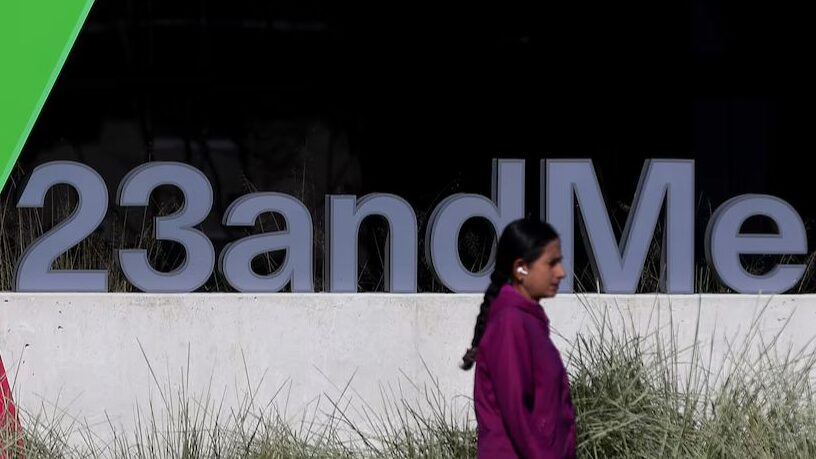Hey there! If you’re one of the 15 million folks who’ve spit into a tube for 23andMe, listen up—your genetic info might be in serious jeopardy. The once-shiny genetic testing company just hit a major rough patch, filing for bankruptcy on March 23, 2025.
And to top it off, California’s Attorney General dropped a bombshell privacy alert that’s got everyone talking. So, what’s the deal? Should you be worried about your DNA data? Spoiler alert: Yes, you should.
Let’s break it all down in a way that’s easy to digest, and I’ll even show you how to kick your data to the curb if you’re ready to take action.
What’s Happening with 23andMe?
Picture this: 23andMe, the company that made digging into your ancestry as easy as mailing a saliva sample, is now in financial freefall. On Sunday, March 23, 2025, they officially filed for bankruptcy.
That’s right—the Silicon Valley darling that peaked at a $6 billion valuation back in 2021 is now scrambling to sell off its assets in court. And guess what’s on the chopping block? Your DNA data. Yep, that super-personal blueprint of who you are could soon belong to someone else.
This isn’t just a random hiccup. The company’s been sliding downhill for a while—its stock crashed to pennies, and a massive data breach in 2023 didn’t help. Then, just hours before the bankruptcy filing, California Attorney General Rob Bonta sounded the alarm with a rare “consumer alert.” His advice?
If you’ve ever used 23andMe, it’s time to think seriously about deleting your data and making sure any leftover spit samples get trashed. Why? Because with the company in chaos, no one knows who might end up with your genetic info—or what they’ll do with it.
Why Your DNA Is a Big Deal
Let’s get real for a sec. Your DNA isn’t just a cool party trick to find out if you’re 2% Viking or prone to hating cilantro. It’s the most intimate info you’ve got—like a roadmap to your health, your family history, and even your future risks. Imagine someone getting their hands on that and figuring out you’ve got a higher chance of heart disease or a rare genetic quirk. Sounds creepy, right? It is.
Here’s the kicker: unlike a leaked password you can reset, you can’t change your DNA. Once it’s out there, it’s out there for good. And in the wrong hands—think hackers, shady companies, or even overzealous law enforcement—it could be used in ways you never signed up for. Insurance companies might jack up your rates, employers could quietly pass you over, or worse, someone could try to blackmail you with it. This isn’t sci-fi; it’s a real risk, especially now that 23andMe’s future is so shaky.
The Bankruptcy Bombshell: What It Means for You
So, why does bankruptcy matter? When a company like 23andMe goes bust, it doesn’t just close up shop and call it a day. It heads to court to sell off whatever it’s got to pay its debts. And one of its juiciest assets? You guessed it—the massive trove of genetic data from 15 million users. That’s a goldmine for anyone looking to buy, whether it’s a pharmaceutical giant, a data broker, or someone with less savory intentions.

23andMe swears there’s “no change” to how it protects your data during this process. But here’s the rub: their privacy policy already says your info could be “accessed, sold, or transferred” if they go through a bankruptcy or sale.
And once those assets switch hands, the new owners might not be as warm and fuzzy about keeping your secrets safe. Privacy experts are waving red flags, pointing out that 23andMe’s had security slip-ups before—like that 2023 breach where hackers snagged data on nearly 7 million users. Bankruptcy could make it even tougher to keep the bad guys out.
California’s AG isn’t mincing words either. Rob Bonta’s alert basically says, “Hey, your DNA’s at risk—act now.” He’s urging folks to use California’s privacy laws to demand 23andMe delete their data and destroy any stored samples. It’s a wake-up call that this isn’t just business as usual—it’s a privacy emergency.
The Privacy Nightmare You Didn’t Sign Up For
Let’s talk about why this feels so unsettling. When you sent your spit to 23andMe, you probably thought you were just getting a fun ancestry report or some health insights. Maybe you even checked a box saying, “Sure, use my data for research.” But did you realize that data could end up as a bargaining chip in a bankruptcy fire sale? Probably not.
Here’s where it gets dicey. Unlike your doctor’s office, 23andMe isn’t covered by HIPAA—the federal health privacy law. That means there’s no ironclad rule stopping them from treating your DNA like any other company asset. And while they’ve got certifications to prove their security is solid, those don’t mean much if the company’s broke or sold to someone who doesn’t care about your privacy.
Privacy advocates are freaking out for a reason. Hackers could swoop in during the chaos, or a new owner might decide to use your DNA for stuff you’d never agree to—like targeted ads for drugs based on your genetic risks. And if you’re thinking, “Well, I’ve got nothing to hide,” consider this: your DNA isn’t just about you. It’s tied to your whole family. One person’s test could spill secrets about siblings, parents, or kids who never signed up for this.
How to Delete Your 23andMe Data (It’s Easier Than You Think!)
Okay, enough doom and gloom—let’s get proactive. If you’re ready to take back control, deleting your 23andMe data is totally doable, and it only takes a minute. I did it myself, and I’m here to walk you through it like a friend showing you the ropes.
Step-by-Step Guide to Wipe Your Data
- Log In: Head to the 23andMe website and sign into your account. You’ll need your email and password handy.
- Go to Settings: Click on your profile name (top right corner), then hit “Settings.”
- Find the Delete Option: Scroll down to “Account Information” and look for “Delete Your Account.” It’s right there waiting for you.
- Confirm It: They’ll ask you to verify your choice—click the link they send to your email. This is just to make sure it’s really you.
- Say Goodbye: Once you confirm, your account’s toast. 23andMe says they’ll delete your data and destroy any stored samples (if you opted to keep them).
A Quick Heads-Up
Before you hit delete, know this: it’s permanent. You won’t get your ancestry results back unless you test again later. Also, they might hang onto some basic info—like your birth date and sex—for legal reasons, but the juicy genetic stuff gets wiped. If you want a souvenir, you can download your raw data first (under “Tools” > “Browse Raw Data” > “Download”). It’s a nerdy keepsake, but it’s yours to keep.
Why Acting Now Matters
Timing’s everything here. With 23andMe in bankruptcy court, the clock’s ticking on who might snag their assets. Deleting your data now means it’s less likely to end up in some random company’s hands later.
Plus, California’s privacy laws give you extra muscle—if you’re a resident, you can legally demand they trash your info, no questions asked. Other states like Virginia and Colorado have similar rules, so check your local laws.
Even if you’re not in a privacy-powerhouse state, taking action feels empowering. It’s like cleaning out your digital closet—why leave sensitive stuff lying around when you don’t have to?
What’s Next for 23andMe (and Your Peace of Mind)?
So, where does this leave 23andMe? They’re still limping along, with ex-CEO Anne Wojcicki stepping down and the company trying to dodge a complete collapse. She’s been pushing to buy it back herself, but her offers keep getting shot down. Meanwhile, the court’s overseeing the asset sale, and potential buyers—like drug companies or tech firms—could swoop in any day.
For you, though, the takeaway’s simple: your DNA’s too precious to gamble with. 23andMe might’ve been a pioneer, but its stumbles show how fragile privacy can be when big tech and big data collide. Deleting your info isn’t just a precaution—it’s a power move to protect yourself and your family.
Read Also: Gators vs Huskies: Can Florida Stop UConn’s Three-Peat March Madness Magic?
Final Thoughts: Take Charge of Your DNA
Look, I get it—finding out you’re part Neanderthal or tracing your roots to a tiny village somewhere was probably a blast. But with 23andMe’s bankruptcy mess, the fun’s over, and the risks are real. You don’t have to sit around wondering if your DNA’s about to star in some corporate horror story. Grab the reins, log in, and delete it. It’s quick, it’s free, and it’s your call.
Got questions or need a hand? Drop a comment—I’m here to help. Your privacy’s worth it, and you’ve got this!

